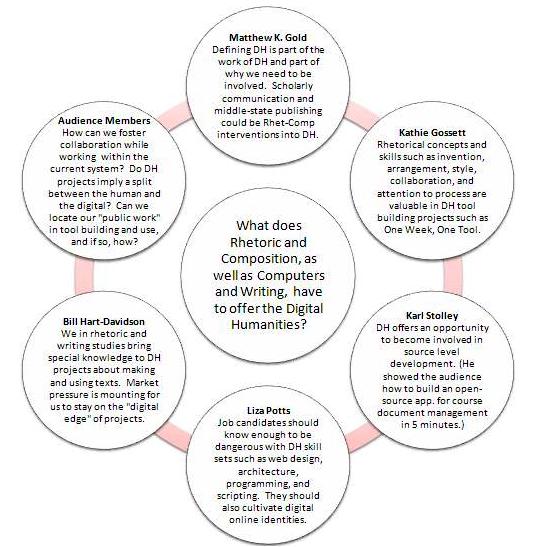Review by Crystal VanKooten
Panelists
Matthew K. Gold, New York City College of Technology
Kathie Gossett, Iowa State University
Karl Stolley, Illinois Institute of Technology
Liza K. Potts, Michigan State University
William Hart-Davidson (respondent), Michigan State University
The “Digital Humanities,” or “DH,” has lately become a buzz phrase throughout English departments and beyond—but what exactly does it mean to call scholarship in the humanities “digital”? Those who call themselves digital humanists are developing and using digital tools to do humanities work—they build; they collaborate with designers, librarians, and programmers outside of the discipline; they develop new methods and questions. But the upswing in attention to the Digital Humanities can leave those in rhetoric and writing studies, and in particular those who situate their work in the computers and writing community, scratching their heads. Wait—we say to ourselves—I use digital tools in my research, teaching, and writing! Am I a digital humanist? And if I call myself one, do I have to study computational linguistics, develop an archive, or build a new tool from scratch? The members of this roundtable answer, “Why Yes, We are Digital Humanists!”, discussing why computers and writing scholarship fits comfortably alongside other work in the Digital Humanities. The graphic below represents a summary of the roundtable conversation between the presenters and the audience.

The presenters stressed that Rhetoric and Composition as well as Computers and Writing have much to offer the Digital Humanities—and vice versa. A sense of urgency permeated the room as the speakers highlighted the rising attention to DH skill-sets, methods, and projects at national conferences, in research, and on the job market. Specific questions from the audience related to the restrictions of current systems and the terminologies used to describe and promote our work (human or digital, for example), however, illustrate that declaring ourselves DHers may be a complex process. In some respects, placing our work within the Digital Humanities becomes a game of taking up or discarding labels at opportune times and when necessary. What label we use may not be of most importance, but instead the ways we are (or are not) willing to rethink how and why we research, teach, consume, and compose in the ways that we do. While the terminologies we use may not be concretized or stable, it is certain that the Digital Humanities very much needs voices from Computers and Writing.
Crystal VanKooten is a Ph.D. candidate in the Joint Program in English and Education at the University of Michigan, where she teaches composition courses and researches new media writing. Her dissertation study explores the potential link between audio-visual composing in the first-year writing classroom and the development of meta-awareness about composition.

1 Comment
Pingback: Why Video Games are Important for Digital Humanists | Not Your Mama's Gamer